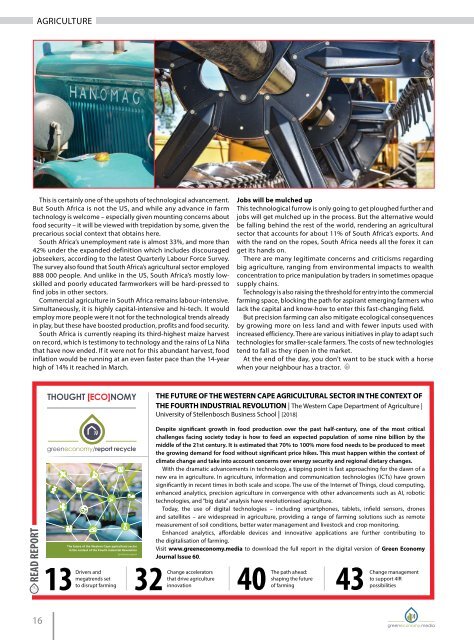Green Economy Journal Issue 60
You also want an ePaper? Increase the reach of your titles
YUMPU automatically turns print PDFs into web optimized ePapers that Google loves.
AGRICULTURE<br />
5-8 February 2024 CTICC, Cape Town, South Africa<br />
This is certainly one of the upshots of technological advancement.<br />
But South Africa is not the US, and while any advance in farm<br />
technology is welcome – especially given mounting concerns about<br />
food security – it will be viewed with trepidation by some, given the<br />
precarious social context that obtains here.<br />
South Africa’s unemployment rate is almost 33%, and more than<br />
42% under the expanded definition which includes discouraged<br />
jobseekers, according to the latest Quarterly Labour Force Survey.<br />
The survey also found that South Africa’s agricultural sector employed<br />
888 000 people. And unlike in the US, South Africa’s mostly lowskilled<br />
and poorly educated farmworkers will be hard-pressed to<br />
find jobs in other sectors.<br />
Commercial agriculture in South Africa remains labour-intensive.<br />
Simultaneously, it is highly capital-intensive and hi-tech. It would<br />
employ more people were it not for the technological trends already<br />
in play, but these have boosted production, profits and food security.<br />
South Africa is currently reaping its third-highest maize harvest<br />
on record, which is testimony to technology and the rains of La Niña<br />
that have now ended. If it were not for this abundant harvest, food<br />
inflation would be running at an even faster pace than the 14-year<br />
high of 14% it reached in March.<br />
READ REPORT<br />
THOUGHT [ECO]NOMY<br />
greeneconomy/report recycle<br />
The future of the Western Cape agricultural sector<br />
in the context of the Fourth Industrial Revolution<br />
Drivers and<br />
megatrends set<br />
to disrupt farming<br />
Synthesis report<br />
Jobs will be mulched up<br />
This technological furrow is only going to get ploughed further and<br />
jobs will get mulched up in the process. But the alternative would<br />
be falling behind the rest of the world, rendering an agricultural<br />
sector that accounts for about 11% of South Africa’s exports. And<br />
with the rand on the ropes, South Africa needs all the forex it can<br />
get its hands on.<br />
There are many legitimate concerns and criticisms regarding<br />
big agriculture, ranging from environmental impacts to wealth<br />
concentration to price manipulation by traders in sometimes opaque<br />
supply chains.<br />
Technology is also raising the threshold for entry into the commercial<br />
farming space, blocking the path for aspirant emerging farmers who<br />
lack the capital and know-how to enter this fast-changing field.<br />
But precision farming can also mitigate ecological consequences<br />
by growing more on less land and with fewer inputs used with<br />
increased efficiency. There are various initiatives in play to adapt such<br />
technologies for smaller-scale farmers. The costs of new technologies<br />
tend to fall as they ripen in the market.<br />
At the end of the day, you don’t want to be stuck with a horse<br />
when your neighbour has a tractor.<br />
THE FUTURE OF THE WESTERN CAPE AGRICULTURAL SECTOR IN THE CONTEXT OF<br />
THE FOURTH INDUSTRIAL REVOLUTION | The Western Cape Department of Agriculture |<br />
University of Stellenbosch Business School | [2018]<br />
Despite significant growth in food production over the past half-century, one of the most critical<br />
challenges facing society today is how to feed an expected population of some nine billion by the<br />
middle of the 21st century. It is estimated that 70% to 100% more food needs to be produced to meet<br />
the growing demand for food without significant price hikes. This must happen within the context of<br />
climate change and take into account concerns over energy security and regional dietary changes.<br />
With the dramatic advancements in technology, a tipping point is fast approaching for the dawn of a<br />
new era in agriculture. In agriculture, information and communication technologies (ICTs) have grown<br />
significantly in recent times in both scale and scope. The use of the Internet of Things, cloud computing,<br />
enhanced analytics, precision agriculture in convergence with other advancements such as AI, robotic<br />
technologies, and “big data” analysis have revolutionised agriculture.<br />
Today, the use of digital technologies – including smartphones, tablets, infield sensors, drones<br />
and satellites – are widespread in agriculture, providing a range of farming solutions such as remote<br />
measurement of soil conditions, better water management and livestock and crop monitoring.<br />
Enhanced analytics, affordable devices and innovative applications are further contributing to<br />
the digitalisation of farming.<br />
Visit www.greeneconomy.media to download the full report in the digital version of <strong>Green</strong> <strong>Economy</strong><br />
<strong>Journal</strong> <strong>Issue</strong> <strong>60</strong>.<br />
13 32 40 43<br />
Change accelerators<br />
that drive agriculture<br />
innovation<br />
The path ahead:<br />
shaping the future<br />
of farming<br />
Change management<br />
to support 4IR<br />
possibilities<br />
CELEBRATE<br />
YEA RS O F<br />
PROGRES S<br />
IN A FRIC A N<br />
30MINING<br />
Join us to celebrate the 30 th anniversary of Investing in<br />
African Mining Indaba next year.<br />
Register now to be part of the landmark event.<br />
REGISTER NOW<br />
16<br />
@miningindaba | #MI24 | miningindaba.com

















